- Home
- Various Authors
The Conan Compendium Page 23
The Conan Compendium Read online
Page 23
The blacksmith's son slew the soldier beside him, too. "Come on!" called Conan to his countrymen. "Here's a gap I've made for you!" Cimmerians rushed forward and poured through it. They suffered one more volley of Bossonian arrows. But then the archers, protected no more from the warriors they had tormented, needed to turn and run if they were to survive. Some saved their gore by flight. The Cimmerians cut down others from behind. Most of the pikemen from Gunderland died where they stood, trying to the last to slow the barbarians' advance.
"Boldly done, son of Mordec," said Herth when the slaying stopped.
With a broad-shouldered shrug, Conan replied, "I could slaughter every Aquilonian soldier in the world, and it would hardly seem vengeance enough."
Herth eyed the crumpled bodies on the sward. He knew how many of them had gone down before Conan's axe. He looked back toward Venarium and Duthil, recalling how many soldiers the blacksmith's son had slain in the fights farther north. "Son of Mordec, I am not a soft man," he said at last. "I have seen wars and battles aplenty, against the AEsir and Vanir, against the Picts, aye, and among our own folk as well. This I tell you, and I speak truly: in the matter of vengeance, those who bore you can have naught over which to complain."
"It is not enough, I tell you." Conan stubbornly set his jaw.
"You could kill and kill and kill, and still you would say the same," observed the clan chief from the north, and Conan nodded, for he knew he could not deny the other man's words. Herth continued, "Killing alone will never sate you."
Nodding again, Conan said, "Like as not, you speak the truth once more. What then? Shall I reckon myself forever unavenged?"
"If you measure vengeance by killing alone, I do not see what other choice you
have," said Herth. "But Aquilonians did not only kill here. They ruled here as well, and that is as hateful to freeborn Cimmerians. I know you are determined to quit your homeland."
"I could be more determined about nothing else," agreed Conan.
"Well and good," said Herth. "I have no quarrel with you there. Perhaps one day you will make a mercenary soldier down in the south, a sergeant or even a captain. Then you may well come to have Aquilonians under your command, and you will rule them as they have ruled here. If anything can, that may complete your revenge."
"By― " But Conan broke off with the oath incomplete, saying, "So it may. Time will tell."
"Time always tells. As you come to have more years, you will begin to wish it held its peace," said Herth. "You do not swear by Crom?"
"Not now," answered Conan. "One of these days, I daresay, I will once more. For now, though, I am as angry at the god as he has shown himself angry at me. If he has robbed me of my nearest and dearest, I will rob him of his name in my mouth.
It is the only thing of his I can take."
Before replying, Herth glanced again at the Aquilonian corpses all around. "I am glad I am not your foe," he said. "Even were I a god myself, I should be glad I was not your foe."
"I know not what you mean," said Conan. Where Herth had looked to the north, he hungrily stared southward. "We should be off. The longer we delay, the more of our foes escape." He kicked at the dirt. "I wish I would have kept Stercus' head, that I might have thrown it across the border into Aquilonia as token of the reason for our rising. But it would have begun to rot and stink by now, and we had no chance to pack it in salt, so I flung it to the swine instead, before we got to Venarium."
"A good enough fate for the Aquilonian," said Herth. Conan grudged a nod,
although fury still seethed in him. The chief went on, "A pity, what befell Duthil.
Otherwise, you could have salt-cured the Aquilonian's head and hung it over your doorway."
"This past little while has seen the end of all I held dear," answered Conan. "My family, my village, her I would have loved ―all gone, all dead. Do you wonder I would quit this accursed land?"
Herth shook his head. "I have already told you no. And the more I see of you, son of Mordec, the less I wonder at anything you might do."
"Onward, then," said Conan, and onward he went. If the war chief who, as much as any Cimmerian, had mustered the northern tribes and clans for war against King Numedides' men chose to follow, Conan did not mind. And if Herth and the other Cimmerians chose to stop where they were, Conan did not mind that, either.
He would go on alone against Aquilonia, an army of one.
Herth did order his men forward once more. He wanted to do the Aquilonians as much harm as he could, and he had little time in which to do it. The summer campaigning season was brief in the north; before long, his men would begin drifting back toward their homes to help in the harvest. In the meantime ― in the meantime, the Aquilonians would pay, and pay, and pay.
Horncalls and fire beacons sent word of danger all along the border. It had been a generation since the Cimmerians invaded Aquilonia, but men whose hair and beards were now grizzled told tales of the last war to those who would fight the next: such has been the way of it since time began.
Melcer escaped the fall of the Aquilonian province in southern Cimmeria only to be dragooned into the army that would try to withstand the barbarians. Since he already had a pike, they did not bother to issue him one. The shortsword they gave him was pitted with rust; the helm they clapped on his head seemed hardly sturdier. When he asked for a coat of mail, they laughed in his face.
"Mitra! You'll want a charger and his caparison next!" said a fat sergeant. "What have you done to deserve iron rings?"
"I have fought the Cimmerians, up in the north," answered Melcer. "What have you done, that you say me nay?"
The sergeant's face darkened with anger. "Speak not so to me, dunghill clod, or you'll wear stripes on your back in place of chainmail."
"If you use all your soldiers this way, you are a fool to trust them in the field behind you," said Melcer. "Any number of ways a fellow who makes his men hate him can find an end."
He did not get the mailshirt, but the sergeant troubled him no more. And he did see Evlea and his children off to the south. The more ground they put between themselves and the barbarian irruption, the happier he was.
Looking north, back into the province he'd had to leave, made Melcer's blood boil. Whenever he did, he saw fresh fires going up. He knew too well what they meant: more farms and settlements burning. What had been civilization was going back to barbarism as fast as it could. Remembering the time and effort he had put into his own farm, knowing how many other settlers had worked just as hard, Melcer cursed both the Cimmerians and Count Stercus, whose brutality had fired their rebellion.
From what the Gunderman had heard, the Aquilonian army had crossed into Cimmeria in one place, had advanced together until it ran into the wild men, and then had beaten them, opening the southern part of the land to settlement. The barbarians' entry into Aquilonian territory was a different business. They slipped across the river by ones and twos, by tens and twenties, and soon Melcer was seeing new fires not in Cimmeria alone, but also in the land Kings of Aquilonia had ruled for generations.
The hastily mustered defense forces rushed this way and that, trying to run the barbarians to earth before they did too much damage. Sometimes they succeeded.
More often, the Cimmerians escaped to burn and plunder and kill somewhere else.
Melcer slept very little. His pikestaff acquired sinister red-brown stains. He found
himself wearing a mailshirt before too long. The underofficer who had had the shirt would never need it again. Of that Melcer was sure. It did not fit him very well, but he stopped grumbling after it stopped an arrow that might have pierced his heart. He soon found himself doing a sergeant's job. He did not get a sergeant's pay―he got no pay at all, only food, and not enough of that―but men recruited after him, men who had not seen what he had seen or done what he had done, listened to what he said and obeyed his commands.
He wondered what he would do if he and his men hunted down Conan and his father. The Cimmeria
ns could have slain him. Conan had not called letting him go an act of friendship or mercy or anything of the sort. But whether he had used the name or not, that was what it amounted to.
Maybe the boy ―the youth, now ―and the great, hulking man who had sired him had perished in the fight at Fort Venarium or one of the smaller skirmishes between Sciliax's farm and the border between Cimmeria and Aquilonia. For the sake of his own conscience, Melcer hoped they had.
He soon had other things to worry about. As more and more barbarians came over the border, the defenders had to split themselves up into smaller and smaller bands to try to deal with all of them. Sometimes a larger swarm of Cimmerians would fall on one of those bands, in which case the result would be massacre, but not massacre of the sort King Numedides' followers wanted.
Melcer and his men and some other soldiers from Gunderland had to clean up the results of one such miscalculation. For a little while, things went better than they had any business doing, for they found some of the Cimmerian sentries drunk asleep, got past them, and assailed the main body of enemy warriors before the barbarians knew they were anywhere close by. But the Cimmerians fought back with a grim, implacable ferocity that stalled the Aquilonian attack at the edge of an orchard.
The trees gave archers excellent cover. Melcer's byrnie turned another Cimmerian arrow. He wondered whether the sergeant who had not wanted to give him a coat of mail still lived. He also wondered whether that sergeant had got into the fighting himself, or whether he had fled south and let others try to hold the barbarians out of Aquilonia.
"Let's go!" shouted Melcer. "We can drive them back!" He rushed at a Cimmerian. The man carried only a shortsword and wore no armor, not even a helmet. He had no chance against a mailed pikeman, and he knew it. He gave ground to save his gore.
Seeing him draw back encouraged the Bossonians and Gundermen with Melcer.
They followed the farmer, where they might not have if the Cimmerian had stood his ground. Here in this little brawl, the civilized soldiers outnumbered their barbarous foes.
Once the fighting got in amongst the apple and pear trees, it was every man for himself. "Numedides!" cried Melcer, and his men took up the cry. The Cimmerians yelled back, some using war cries in their own language, others calling down curses on Numedides' head in broken Aquilonian.
A Cimmerian threw a stone at Melcer. The chainmail kept it from breaking ribs, but he knew he would wear a bruise despite the padding under the links of iron.
He saw another Cimmerian with an axe hotly engaged against a Gunderman, and rushed over to help his countryman finish the enemy warrior.
Before he got there, the Cimmerian cut down the other pikeman. The fellow brought up his axe, ready to chop at Melcer, who set himself for a lunge at the barbarian. They both checked themselves in the same instant, exclaiming, "You!"
In that frozen moment, Melcer made his choice. He drew back and lowered his spear, saying, "Go your way, Conan. You spared me and mine when you might have slain. I can do no less for you. Is your father here as well?"
"No." The young barbarian shook his head. "He fell at Venarium. Stay safe, Melcer. Maybe some other Cimmerian will bring you down."
"We were invaders in your land," said Melcer. "You fought hard to drive us out.
You are the invaders here. Do you think we will act differently?"
Conan shrugged broad shoulders: a man's shoulders, though he was not yet a man. "I care not. Find a new foe. I will do the same."
Melcer drew back another pace before looking for a different Cimmerian to fight, in case Conan meant trickery. He and his countrymen won the skirmish. They were happy enough to plunder the corpses of those who had stood against them.
Melcer prowled the orchard to see if one of those corpses were Conan's.
He did not find the blacksmith's son's body. He never saw the Cimmerian again.
But he had reason to remember him the rest of his days.
We can't turn back," said a lean, gloomy young Cimmerian named Talorc as he and his comrades sprawled around a fire in the hills of Gunderland. "Too many of those accursed Aquilonian dogs between us and the border."
One of his comrades was Conan. "If we can't go back, we go on," he said, and swigged from a skin of wine taken from a tavern.
Most of their fellows had not penetrated so deeply into Numedides' kingdom.
They were no longer part of an army. They were a bandit band, out for loot and out to stay alive in a land roused against them.
A howl came from off in the distance. In Cimmeria, it would have been a wolfs cry in the night. Here, Conan cursed. He had come to know too well the belling of hunting hounds ―and this hound sought his scent, and his companions'. "We made a mistake," he said. "We should have left someone behind to deal with the dog. An arrow out of the night, and we wouldn't have had to worry about it any more."
"They would only have brought up another one." Talorc spoke with a certain grim fatalism.
"We would kill that one, too," said Conan. Some of the others seemed to think their chances poor. That calculation had never entered Conan's mind. He was still alive. He still had weapons ready to hand. As long as he could, he would go on struggling to survive.
Another howl resounded, this one closer and louder and more excited: the dog
had found the Cimmerians' trail. The calls of men floated on the breeze, too. They also sounded excited. They hoped they were going to run this band of barbarians to earth and be rid of it for good.
Conan had a different idea. "They think they will come on us unawares and scatter us," he said; he had already seen the Aquilonians do that once, and had barely come out of the trap alive. "Let's give them a surprise. How will they like it if they find an ambush waiting for them?"
He had to browbeat the rest of the Cimmerians into moving. Some of them would not, and sprawled by the side of the fire, careless of what might happen to them.
Conan let them stay where they were. If anything, catching sight of them would help spur on the enemy, help make him careless.
And that was exactly what happened. Spying the Cimmerians slumped there, the Aquilonians stormed forward, certain they would have easy pickings. The barrage of spears and arrows that greeted them from both flanks sent them running away even faster than they had advanced. Now they cried out in terror, not triumph.
Conan made sure the dog did not live.
Afterwards, he found only a couple of his countrymen hurt, while half a dozen Aquilonians sprawled in death along the track. Now Conan plundered the corpses.
He did not know what he would do with the lunas he took from a dead man's belt pouch. The man's sword, though, was another story. He knew just what to do with that, and hung it on his belt in case something happened to his father's axe.
The Cimmerians pressed ever deeper into Aquilonia. Part of that was Conan's urge to drive the knife home as best he could, the rest a half-formed hope that the Aquilonians would not trouble them so much once they moved farther from the border. That hope proved forlorn. The Aquilonians cared no more for banditry than Conan's folk would have with a gang of Gundermen loose in their land.
One by one, the other raiders fell. The band fissured: now one man, now two or three, would give up, break off, and try to go back to Cimmeria. Conan never learned what happened to those warriors. He would not have bet it was anything good. As for himself, he had no thought of tomorrow past stealing a sheep or a pig and keeping his belly full. The brigand's life, the thief's life, turned out to suit
him better than any he had known in Duthil.
After a while, only eight or ten Cimmerians were left with him. He did not think they were in Gunderland any more by then. They had penetrated into Aquilonia proper. The folk who dwelt here looked different and spoke differently from the Gundermen Conan had come to know so well. Many of them did not seem to recognize the raiders for what they were, either.
Conan gulped wine in a farmhouse the men from the north had just plundered.
/>
The farmer lay dead on the floor at his feet. "It's been a long time since Cimmerians pushed this deep into Aquilonia," he exulted.
Talorc had drunk more than Conan had ―had drunk himself sad, in fact. He began to weep now, saying, "We'll never go home again, either."
"Well, so what?" said Conan. "I've got nothing to go home to, anyhow.
Numedides' men made damned sure of that. Best thing I can do now is pay them back in their own coin."
Talorc wept harder. "They'll kill us." He was hardly older than Conan.
"They haven't done it yet," said Conan. "They can keep on trying." He stirred the dead Aquilonian farmer with his boot. "Until they manage, I'm not going to worry about it." Some of the other Cimmerians laughed. The rest, more inclined to Talorc's mood than to Conan's, drank until the farmhouse held nothing more to drink.
They left the place before sunup the next morning. As day brightened, Conan could see a few clouds of smoke rising well to the north: the sign other Cimmerian bands still roamed their enemies' land. His companions did not fire the farmhouse. That would have brought Aquilonian notice to them, and they had already had more notice from King Numedides' soldiers than they wanted.
Later that day, a squadron of Aquilonian knights rode north past them without slowing down, without recognizing them for what they were. Conan laughed at that, but not for long. The knights might not trouble him, but they would help
harry his countrymen out of Aquilonia. He wished he could do them a bad turn.
The worst turn he could think of was simply surviving.
Somewhere to the south and east lay Tarantia, Numedides' glittering capital. Had any Cimmerian ever reached it? The blacksmith's son had no idea. He did want to see it before the Aquilonians hunted him down, though. That would be a triumph of sorts.
Two days later, he discovered that not all the Aquilonians failed to see Cimmerians for what they were. A raucous cry rang out: "There they are, the murdering bastards!" About a dozen men from the south, farmers and townsfolk kitted out with the same odd mix of weapons and armor as the brigands bore, came loping toward them across a field. One of the Aquilonians shouted something else: "Kill them! Kill them all!"

 Lady Ambleforth's Afternoon Adventure by Ann Lethbridge, Barbara Monajem, Annie Burrows, Elaine Golden, Julia Justiss and Louise Allen
Lady Ambleforth's Afternoon Adventure by Ann Lethbridge, Barbara Monajem, Annie Burrows, Elaine Golden, Julia Justiss and Louise Allen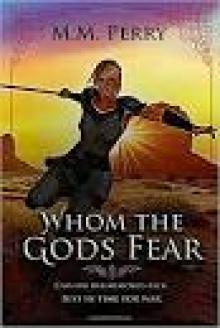 Gods & Mortals
Gods & Mortals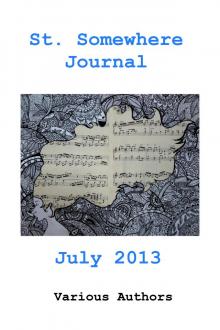 St. Somewhere Journal, July 2013
St. Somewhere Journal, July 2013 firstwriter.com First Short Story Anthology
firstwriter.com First Short Story Anthology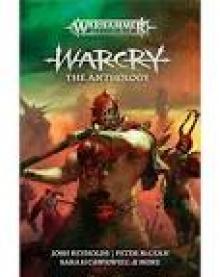 Warcry: The Anthology
Warcry: The Anthology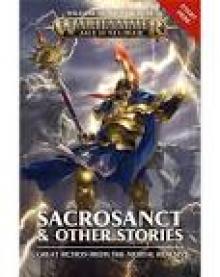 Sacrosanct & Other Stories
Sacrosanct & Other Stories Ultimate Heroes Collection
Ultimate Heroes Collection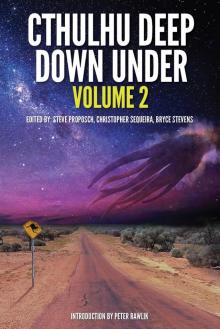 Cthulhu Deep Down Under Volume 2
Cthulhu Deep Down Under Volume 2 Erotic Classics II
Erotic Classics II Dynasties: The Elliotts, Books 1-6
Dynasties: The Elliotts, Books 1-6 Dynasties:The Elliots, Books 7-12
Dynasties:The Elliots, Books 7-12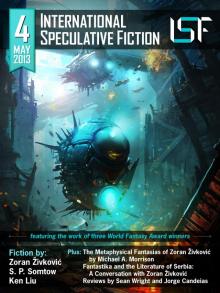 International Speculative Fiction #4
International Speculative Fiction #4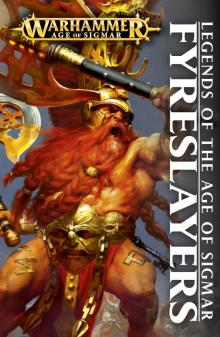 Fyreslayers
Fyreslayers One Night In Collection
One Night In Collection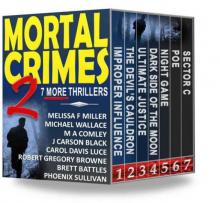 Mortal Crimes 2
Mortal Crimes 2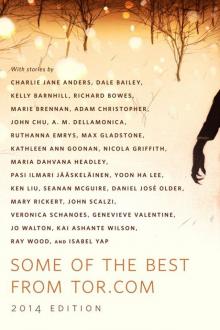 Some of the Best from Tor.com
Some of the Best from Tor.com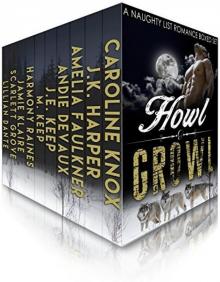 Howl & Growl: A Paranormal Romance Boxed Set
Howl & Growl: A Paranormal Romance Boxed Set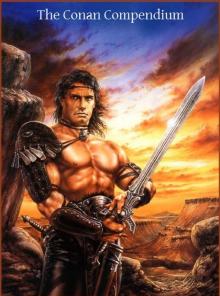 The Conan Compendium
The Conan Compendium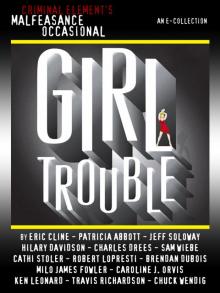 The Malfeasance Occasional
The Malfeasance Occasional Brides of Penhally Bay - Vol 4
Brides of Penhally Bay - Vol 4 Brides of Penhally Bay - Vol 2
Brides of Penhally Bay - Vol 2 Brides of Penhally Bay - Vol 1
Brides of Penhally Bay - Vol 1 School's in Session
School's in Session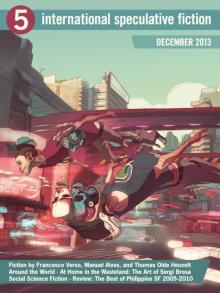 International Speculative Fiction #5
International Speculative Fiction #5 Erotic Classics I
Erotic Classics I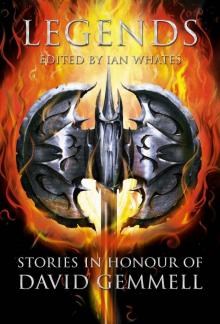 Legends: Stories in Honor of David Gemmell
Legends: Stories in Honor of David Gemmell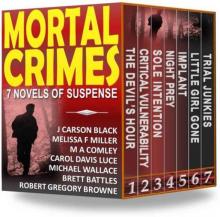 Mortal Crimes 1
Mortal Crimes 1 The Classic Children's Literature Collection: 39 Classic Novels
The Classic Children's Literature Collection: 39 Classic Novels Don't Read in the Closet volume one
Don't Read in the Closet volume one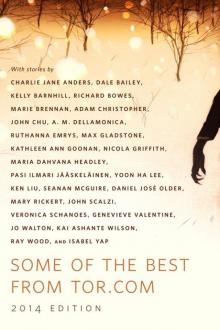 Some of the Best from Tor.com: 2014: A Tor.Com Original
Some of the Best from Tor.com: 2014: A Tor.Com Original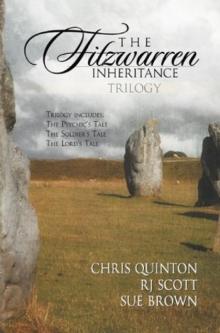 The Fitzwarren Inheritance
The Fitzwarren Inheritance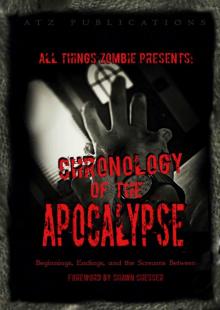 All Things Zombie: Chronology of the Apocalypse
All Things Zombie: Chronology of the Apocalypse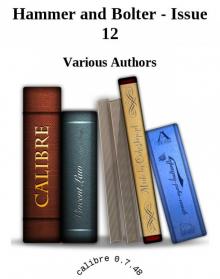 Hammer and Bolter - Issue 12
Hammer and Bolter - Issue 12 Kiss Kiss
Kiss Kiss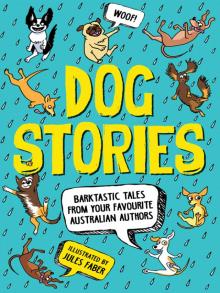 Dog Stories
Dog Stories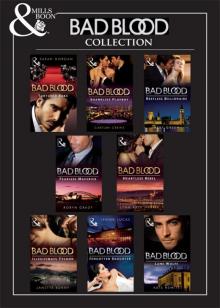 Bad Blood Collection
Bad Blood Collection